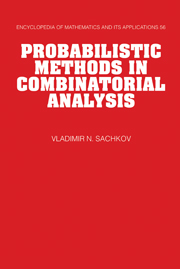Book contents
- Frontmatter
- Contents
- Preface
- Preface to the English translation
- Introduction
- 1 Relevant elements of probability theory
- 2 Combinatorial properties of random nonnegative matrices
- 3 Probabilistic problems in the general combinatorial scheme
- 4 Random partitions of sets
- 5 Random permutations
- 6 Random graphs and random mappings
- References
- Index
Introduction
Published online by Cambridge University Press: 18 March 2010
- Frontmatter
- Contents
- Preface
- Preface to the English translation
- Introduction
- 1 Relevant elements of probability theory
- 2 Combinatorial properties of random nonnegative matrices
- 3 Probabilistic problems in the general combinatorial scheme
- 4 Random partitions of sets
- 5 Random permutations
- 6 Random graphs and random mappings
- References
- Index
Summary
Many branches of mathematics owe a debt to classical combinatorics. This is especially true of probability theory. Plenty of good examples show how combinatorial considerations lead to very deep and difficult probabilistic results. The links between combinatorial and probabilistic problems have played an important role in forming probability theory as a mathematical discipline, and now manifest themselves in elementary courses devoted to this subject. The initial stage of the development of probability theory was characterized by the essential contribution of combinatorial methods in forming the mathematical background of the science. The current situation is quite different: well-developed probabilistic methods find a wide range of applications in solving various combinatorial problems. This is revealed in the search for asymptotic results in combinatorial analysis, where the probabilistic formulations of combinatorial problems provide the possibility to use the working system of notions of probability theory effectively and to take advantage of the powerful techniques of limit theorems in finding asymptotic formulae. It is appropriate to mention here that asymptotic results play an essential role in combinatorial analysis: they simplify calculations in problems oriented to applications and present the whole picture of investigated phenomena in a more transparent form.
For convenience of references some basic notions and facts of probability theory are listed in the first chapter of the book. Although these facts are presented in a systematic and unified form, this part of the monograph is not assumed to be a sub-stitute for a textbook on probability theory, but is directed to those readers who have some basic knowledge of the subject.
Information
- Type
- Chapter
- Information
- Probabilistic Methods in Combinatorial Analysis , pp. ix - xPublisher: Cambridge University PressPrint publication year: 1997
